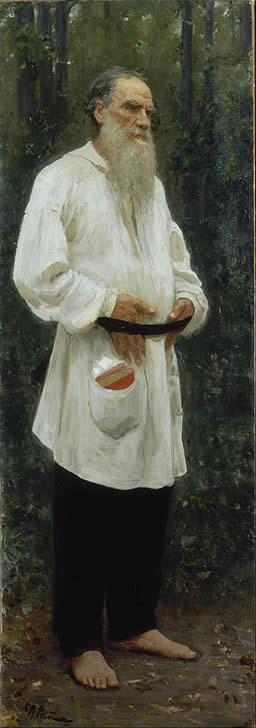Tolstoy chose poverty and denial of the will
 Tolstoy dressed in peasant clothing, in 1901
Tolstoy dressed in peasant clothing, in 1901
After reading Schopenhauer's "The World as Will and Representation", Tolstoy gradually became converted to the ascetic morality avoiding physical pleasures and living a simple life, for religious reasons. In Chapter VI of A Confession, Tolstoy quoted the final paragraph of Schopenhauer's work. It explains how a complete denial of self causes only a relative nothingness which is not to be feared. After reading passages such as the following, the Russian nobleman chose poverty and formal denial of the will:
But this very necessity of involuntary suffering (by poor people) for eternal salvation is also expressed by that utterance of the Savior (Matthew 19:24): "It is easier for a camel to go through the eye of a needle, than for a rich man to enter into the kingdom of God." Therefore, those who were greatly in earnest about their eternal salvation, chose voluntary poverty when fate had denied this to them and they had been born in wealth. Thus Buddha was born a prince, but voluntarily took to the mendicant's staff; and Francis of Assisi, the founder of the mendicant orders who, as a youngster at a ball, where the daughters of all the notabilities were sitting together, was asked: "Now Francis, will you not soon make your choice from these beauties?" and who replied: "I have made a far more beautiful choice!" "Whom?" "La povertà (poverty)"
:whereupon he abandoned every thing shortly afterwards and wandered through the land as a mendicant.
In 1884, Tolstoy wrote a book called What I Believe. He affirmed his belief in Jesus Christ's teachings and was particularly influenced by the Sermon on the Mount, and the injunction to turn the other cheek, which he understood as a "commandment of non-resistance to evil by force" and a doctrine of pacifism and nonviolence.
Based on Christ's teachings, Tolstoy derived the philosophy "Non-resistance during conflict". This idea in Tolstoy's book "The Kingdom of God Is Within You" directly influenced Mahatma Gandhi and therefore also nonviolent resistance movements to this day.